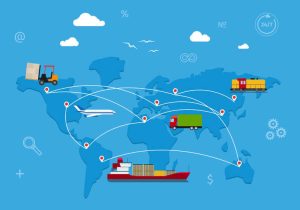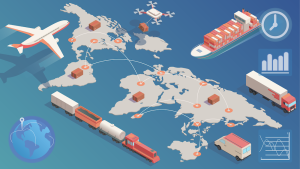Emerging Markets and Their Impact

Emerging markets are increasingly reshaping global trade dynamics through significant economic growth. Countries such as China, India, and Brazil are not just participants but are becoming major influencers in the international trade arena. Their rapid industrialization and expanding consumer bases are driving global demand for a wide range of goods and services. This economic growth is not only enhancing their domestic markets but also increasing their influence on global supply chains. These markets continue to grow, they are expected to play a pivotal role in defining future trade patterns and economic policies worldwide.
Future directions in global trade dynamics suggest a trend towards market diversification. Businesses and economies are recognizing the need to reduce dependency on a limited number of markets. Diversifying trade partnerships can mitigate risks associated with economic downturns, political instability, or supply chain disruptions in any single region. As emerging markets continue to develop, they provide new opportunities for diversification, enabling companies to tap into new consumer bases and investment prospects. This shift towards diversification is likely to foster more resilient and stable global trade networks.
Technological Advancements in Trade
The impact of artificial intelligence (AI) on global trade dynamics is profound and multifaceted. AI technologies are revolutionizing supply chain management, enhancing efficiency, and reducing costs. Predictive analytics powered by AI can forecast demand more accurately, optimize inventory levels, and streamline logistics. Additionally, AI-driven automation is transforming manufacturing processes, enabling faster production cycles and higher precision. As AI continues to advance, its integration into global trade practices is expected to deepen, leading to more intelligent and responsive trade networks.
Blockchain technology is also playing a crucial role in reshaping global trade dynamics. By providing a decentralized and transparent ledger system, blockchain enhances the security and traceability of transactions. This is particularly beneficial in reducing fraud and ensuring the authenticity of traded goods. Blockchain’s ability to streamline documentation and compliance processes can significantly reduce administrative burdens and expedite cross-border transactions. As blockchain technology matures, its adoption is likely to increase, driving greater efficiency and trust in global trade operations.
Sustainable Trade Practices
Sustainable trade practices are becoming increasingly important in the evolving global trade dynamics. There is a growing recognition that economic growth must be balanced with environmental stewardship and social responsibility. Companies are adopting sustainable practices such as reducing carbon footprints, minimizing waste, and promoting fair labor practices. These initiatives not only enhance corporate reputation but also meet the rising consumer demand for environmentally and socially responsible products. As sustainability becomes a key criterion for trade, businesses that prioritize sustainable practices are likely to gain a competitive edge in the global market.
Integrating sustainability into future global trade dynamics involves a comprehensive approach that includes policy frameworks, corporate strategies, and consumer behavior. Governments are enacting regulations to promote sustainable trade, such as carbon pricing and environmental standards. Companies are embedding sustainability into their core business strategies, from sourcing raw materials to product design and distribution. Consumers, increasingly aware of the environmental and social impact of their purchases, are driving demand for sustainable products. This collective effort towards sustainability is expected to shape the future landscape of global trade, fostering a more responsible and equitable trading system.
Geopolitical Influences on Trade Policies

Geopolitical tensions are significantly shaping global trade dynamics, leading to policy shifts and realignments. Trade wars, sanctions, and diplomatic conflicts can disrupt trade flows and create uncertainty in the global market. For instance, the US-China trade tensions have led to tariffs and trade barriers, affecting global supply chains and prompting companies to reassess their trade strategies. Such geopolitical factors compel nations and businesses to adapt quickly, often leading to the development of new trade routes, alliances, and policies to mitigate risks and maintain trade continuity.
Emerging markets are also influencing global trade dynamics through strategic adaptations. As these markets gain economic clout, they are leveraging their positions to negotiate favorable trade terms and establish new trade partnerships. Countries like India and Brazil are actively seeking to expand their trade networks beyond traditional partners, exploring new markets in Africa, Southeast Asia, and Latin America. These strategic adaptations not only enhance their economic resilience but also contribute to the diversification and stability of global trade.
Future of Trade Agreements
The evolution of multilateral trade agreements is a key aspect of global trade dynamics. Traditional trade agreements re-evaluated and modernized to address contemporary challenges such as digital trade, intellectual property rights, and environmental sustainability. These agreements aim to create a more inclusive and equitable trading system, ensuring that the benefits of trade widely shared among participating nations.
The impact of technology on future trade agreements is profound. Digitalization is transforming how trade agreements are negotiated, implemented, and monitored. Technologies such as AI and blockchain are enhancing the transparency and efficiency of trade negotiations, enabling real-time data analysis and secure transaction records. These technological advancements are also facilitating the enforcement of trade agreements, ensuring compliance and reducing disputes. As technology continues to evolve, it will play an increasingly integral role in shaping the structure and functionality of future trade agreements, driving more efficient and reliable global trade practices.
Conclusion
In conclusion, the future directions of global trade dynamics shaped by a confluence of factors including the rise of emerging markets, technological advancements, sustainable practices, geopolitical influences, and the evolution of trade agreements. Each of these elements is contributing to the transformation of global trade, creating a more interconnected, efficient, and sustainable trading system. As we navigate these changes, it is essential for businesses, policymakers, and stakeholders to remain adaptive and forward-thinking, ensuring that global trade continues to thrive in an ever-evolving landscape.










